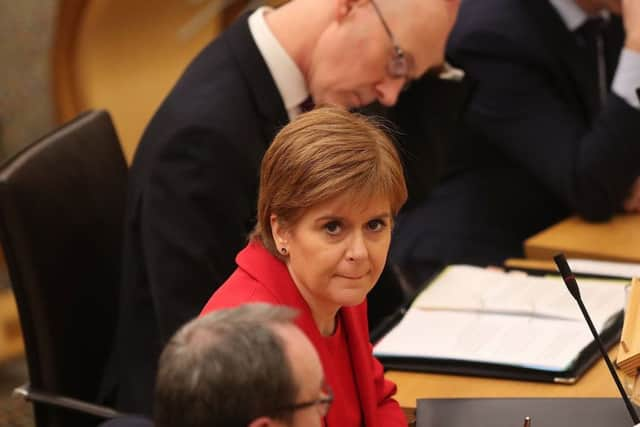What is the Scottish Ministerial code and how might it affect Nicola Sturgeon?
In the months since, questions have continued to be asked over the conduct of Mr Salmond’s successor as First Minister Nicola Sturgeon, even as the Scottish Government was found to have acted ‘unlawful’ in its investigation.
Now, Labour have officially requested that Ms Sturgeon refer herself to an independent panel to determine whether or not she breached the ministerial code.


Advertisement
Hide AdAdvertisement
Hide AdThat allegation, which Scottish Labour Richard Leonard says merits a separate investigation, centres on Ms Sturgeon’s meetings and discussions with Mr Salmond while the probe into alleged sexual misconduct was ongoing.
Mr Salmond has denied the allegations, and Ms Sturgeon says it is ‘self-evident’ that she didn’t interfere in the investigation.
With a probe into the First Minister looking likely, we look at what the ministerial code is, and how an inquiry might work.
Ministerial Code
Like much of the standing orders and other regulations that govern the rules of the Scottish Parliament, the Ministerial Code is based on a Westminster equivalent.
The guiding principle of the code, which applies to Scottish Government Ministers, is: “Scottish Ministers are expected to maintain high standards of behaviour and to behave in a way that upholds the highest standards of propriety.”
The updated version of the code also mandates ministers to abide by the Seven Principles of Public Life. These are; selflessness, integrity, objectivity, accountability, openness, honest and leadership.
Any investigation into Nicola Sturgeon’s much-criticised meetings with her predecessor is likely to centre on section 4.23 of the updated code.
That states: “If Ministers meet external organisations or individuals and find themselves discussing official business without an official present – for example at a party conference, social occasion or on holiday – any significant content (such as substantive issues relating to Government decisions or contracts) should be passed back to their Private Offices as soon as possible after the event, who should arrange for the basic facts of such meetings to be recorded.”
Advertisement
Hide AdAdvertisement
Hide AdIn the case of the first meeting Ms Sturgeon had with Alex Salmond, the First Minister only informed the Scottish Government’s Permanent Secretary it had taken place once a second meeting had been requested.
The panel
The panel on the ministerial code will, if an investigation is called for by either the Scottish Parliament or Ms Sturgeon herself, make a ruling on whether the code has been breached.
Officially, the code itself only makes reference to the ‘independent advisers’ on the ministerial code, who can make a ruling.
Unofficially, changes brought in under Alex Salmond meant that the panel was considered to have been made up of former Presiding Officers of the Scottish Parliament.
The First Minister also has the power to add to the panel of advisers, and ask them to undertake an inquiry.
When he referred himself to the panel amid controversy over legal advice on the EU during the independence referendum, Alex Salmond asked David Bell, a former senior civil servant and then-head of Reading University, to investigate a complaint against him.
Given that the complaint related in some way to the actions of Scottish Government law officers, and the ex-Presiding Officers were themselves former law officers, an external adviser was considered more appropriate to lead the probe.
Who will lead?
If the increasingly likely investigation into Ms Sturgeon takes place, and is not yet apparent who will lead it.
Advertisement
Hide AdAdvertisement
Hide AdGiven that former Presiding Officer Tricia Marwick was at Alex Salmond’s side during his court appearance, it is highly unlikely that she would be part of an investigatory panel.
That leaves the ranks of former Presiding Officers down to just two after the death of Alex Fergusson last year.
Whatever makeup the panel has, it is clear that any investigation into Nicola Sturgeon would be high-profile, highly controversial, and high on the agenda for those who want clearer answers from the First Minister on her behaviour during the investigation into Alex Salmond.
